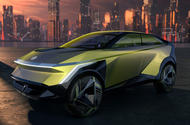Rakish crossover gives hints to future production cars
Hyper-Urban concept is the first of four future-previewing cars Nissan is taking to the Tokyo motor show
The new Nissan Hyper Urban concept is a sustainability-focused city runaround that previews the design and technological capability of the Japanese firm’s upcoming EVs.
The first of a family of concepts Nissan is unveiling in the run-up to the Tokyo motor show later this month, the Hyper Urban follows last week’s London debut of the striking 20-23 concept, a race-inspired electric hot hatch which nods to the next Nissan Micra.
Hot urban EV concept previews all-new Nissan Micra
This latest concept kicks off a new series of ‘hyper’ concepts, so called because Nissan wants to convey “the heightened excitement they aim to bring”. Each is represented by its own ‘symbolic’ character and has “custom-tailored features that add value to unique lifestyles and diverse aspirations”.
The striking Hyper Urban has been designed with a number of outlandish features which make “a bold statement while also effectively blending in with its environment”, Nissan says.
Its bodywork is painted in a special chromatic shade of yellow, for example, which changes colour according to the angle of the light hitting it, while scissor doors feature at the front and rear.
Meanwhile, the sleek silhouette has been conceived for optimal aerodynamic efficiency and it is equipped with eye-catching wide tyres which “complete the sporty look”.
The interior, said to be inspired by kaleidoscopic triangles, features a customisable instrument panel and infotainment display – plus front seats that fold into the rear to create a lounge-style sofa arrangement.
“Park it inside a loft apartment or bungalow so that it becomes an interior space to unwind,” Nissan suggests.
Emphasising its sustainability focus, the Hyper Urban can theoretically be kept fully up to date with regular hardware and software updates, even featuring a removable instrument panel that can be swapped out as required for one hosting the latest graphic technology.
The concept is also equipped with vehicle-to-grid charging functionality which can help to balance power flow in peak periods, reducing pressure on the electricity network and allowing the owner to earn money while they charge.
Nissan has not specified which of the concept’s technological or stylistic attributes will be carried across to next-generation production cars, but clearly the Hyper Urban is more overtly conceptual than last week’s 20-23 concept.
Company CEO Makoto Uchida recently announced that the firm will only launch electric cars in Europe from now on, and will stop selling combustion cars in the region as soon as 2030. In line with this pledge, Nissan will launch 19 new electric cars over the next seven years, including successors to today’s Micra and Leaf, and likely electric replacements for the Juke, Qashqai and X-Trail.
Nissan will reveal three more concepts digitally in the run-up to the Tokyo motor show, and is expected to showcase all four cars together on its show stand from 26 October, giving clues as to what to expect from each of these 19 new EVs.





